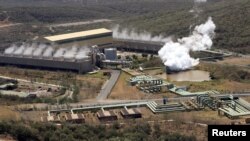Scholz's government sees great potential in achieving energy and climate partnerships with Nairobi, a government source said.
Kenya is already Germany's biggest trading partner from East Africa and is planning to fully cover its energy needs with renewables by 2030.
For Scholz's government, Kenya plays a role as an "important economic and value partner."
Geothermal power is key in Kenya's energy mix and offers "excellent conditions" for the production of green hydrogen.
"The hope is that green hydrogen could eventually be imported from Kenya," added the German government source.
Scholz will be visiting a geothermal power plant at Lake Naivasha on Saturday.
German leaders have over the last months been sealing energy deals with a wide variety of countries after it was forced to rapidly wean itself off cheap Russian energy imports following Moscow's invasion of Ukraine.
The relationship is more complex with Ethiopia, where Scholz will begin his three-day trip.
Scholz, who is due to meet Ethiopian Prime Minister Abiy Ahmed on Thursday, aims to "acknowledge and support the progress made in the peace process that began in November, but at the same time call for further steps."
In particular, focus will be on "grave human rights violations" that Scholz will seek to raise.
In Addis Ababa, the German chancellor will also visit the headquarters of the African Union, which is currently mediating in the Sudan crisis.
This week's trip marks the second time that the chancellor is visiting Africa since taking office in December 2021.
The tour underlines the strategic importance of the continent and the efforts undertaken by Western states to counter China and Russia's overtures to the region.
Scholz will seek to rectify Russian propaganda justifying its war on Ukraine as a result of NATO's expansion zeal.
With an eye on China's huge economic investments in Africa, Scholz will also seek to "offer political and economic cooperation on equal terms," the government source said.
